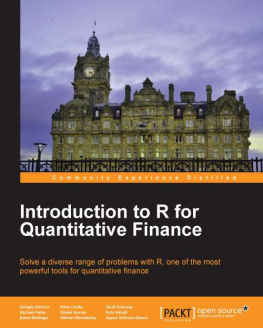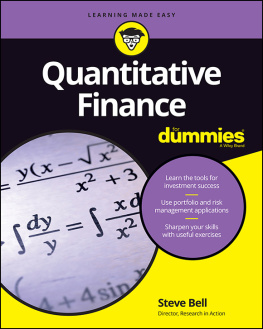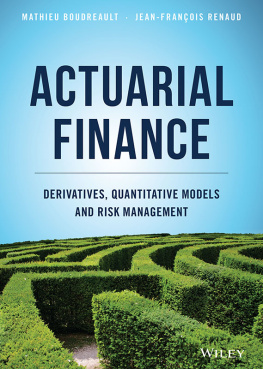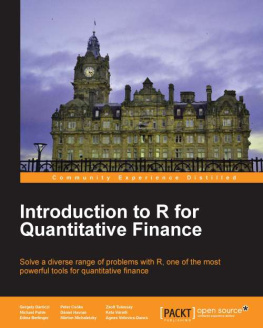Dr. Hari Shanker Gupta
About the Authors
Gergely Darczi is a Ph.D. candidate in Sociology with around eight years' experience in data management and analysis tasks within the R programming environment. Besides teaching Statistics at different Hungarian universities and doing data analysis jobs for several years, Gergely has founded and coordinated a UK-based online reporting startup company recently. This latter software or platform as a service which is called rapporter.net will potentially provide an intuitive frontend and an interface to all the methods and techniques covered in the book. His role in the book was to provide R implementation of the QF problems and methods.
I am more than grateful to the members of my little family for their support and understanding, even though they missed me a lot while I worked on the R parts of this book. I am also really thankful to all the co-authors who teach at the Corvinus University of Budapest, Hungary, for providing useful content for this co-operation.
Michael Puhle obtained a Ph.D. in Finance from the University of Passau in Germany. He worked for several years as a Senior Risk Controller at Allianz Global Investors in Munich, and as an Assistant Manager at KPMG's Financial Risk Management practice, where he was advising banks on market risk models. Michael is also the author of Bond Portfolio Optimization published by Springer Publishing .
Edina Berlinger has a Ph.D. in Economics from the Corvinus University of Budapest. She is an Associate Professor, teaching corporate finance, investments, and financial risk management. She is the Head of Department for Finance of the university and is also the Chair of the Finance Sub committee the Hungarian Academy of Sciences. Her expertise covers student loan systems, risk management, and, recently, network analysis. She has led several research projects in student loan design, liquidity management, heterogeneous agent models, and systemic risk.
Pter Cska is an Associate Professor at the Department of Finance, Corvinus University of Budapest, and a research fellow in the Game Theory Research Group, Centre For Economic and Regional Studies, Hungarian Academy of Sciences. He received his Ph.D. in Economics from Maastricht University in 2008. His research topics include risk measures, risk capital allocation, game theory, corporate finance, and general equilibrium theory. He is currently focused on analyzing risk contributions for systemic risk and for illiquid portfolios. He has papers published in journals such as Mathematical Methods of Operational Research, European Journal of Operational Research, Games and Economic Behaviour , and Journal of Banking and Finance . He is the Chair of the organizing committee of the Annual Financial Market Liquidity Conference in Budapest.
Daniel Havran is a Post Doctoral Fellow at the Institute of Economics, Centre for Economic and Regional Studies, Hungarian Academy of Sciences. He also holds a part-time Assistant Professorship position at the Corvinus University of Budapest, where he teaches Corporate Finance (BA and Ph.D. levels), and Credit Risk Management (MSc) courses. He obtained his Ph.D. in Economics at Corvinus University of Budapest in 2011. His research interests are corporate cash, funding liquidity management, and credit derivatives over-the-counter markets.
Mrton Michaletzky obtained his Ph.D. degree in Economics in 2011 from Corvinus University of Budapest. Between 2000 and 2003, he has been a Risk Manager and Macroeconomic Analyst with Concorde Securities Ltd. As Capital Market Transactions Manager, he gained experience in an EUR 3 bn securitization at the Hungarian State Motorway Management Company. In 2012, he took part in the preparation of an IPO and the private placement of a Hungarian financial services provider. Prior to joining DBH Investment, he was an assistant professor at the Department of Finance of CUB.
Zsolt Tulassay works as a Quantitative Analyst at a major US investment bank, validating derivatives pricing models. Previously, Zsolt worked as an Assistant Lecturer at the Department of Finance at Corvinus University, teaching courses on Derivatives, Quantitative Risk Management, and Financial Econometrics. Zsolt holds MA degrees in Economics from Corvinus University of Budapest and Central European University. His research interests include derivatives pricing, yield curve modeling, liquidity risk, and heterogeneous agent models.
Kata Vradi is an Assistant Professor at the Department of Finance, Corvinus University of Budapest since 2013. Kata graduated in Finance in 2009 from Corvinus University of Budapest, and was awarded a Ph.D. degree in 2012 for her thesis on the analysis of the market liquidity risk on the Hungarian stock market. Her research areas are market liquidity, fixed income securities, and networks in healthcare systems. Besides doing research, she is active in teaching as well. She teaches mainly Corporate Finance, Investments, Valuation, and Multinational Financial Management.
Agnes Vidovics-Dancs is a Ph.D. candidate and an Assistant Professor at the Department of Finance, Corvinus University of Budapest. Previously, she worked as a Junior Risk Manager in the Hungarian Government Debt Management Agency. Her main research areas are government debt management in general, especially sovereign crises and defaults.










